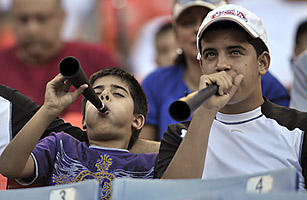
Baseball fans blow their horns before a Florida Marlins baseball game in Miami on June 19, 2010. The horns are similar to vuvuzelas, the noisemakers all the rage at South Africa's World Cup
As soccer fans know all too well, watching this summer's World Cup can feel like sticking your face inside a beehive. The vuvuzela — the plastic horn that has provided the tournament's deafening soundtrack — has been portrayed as a species indigenous to South Africa. But could these buzzing buzz killers come to the U.S.?
One answer is that they're already here. Fifteen thousand vuvuzela-style horns were handed out at a Florida Marlins home game on June 19, and despite the players' frustration — "I can't tell you how awful it was," said center fielder Cody Ross — the fans happily blew the house down. "[They] loved them," says Sean Flynn, the Marlins' vice president of marketing. "There was an unbelievable atmosphere."
The Marlins' marketing team didn't bring them in on a bandwagon whim. As an homage to the South African World Cup, they ordered their branded horns back in February through Match-Up Promotions, which connected the Marlins and with a supplier in China, where 90% of the South African trumpets have reportedly been made. Match-Up counts 20 professional teams in the U.S. among their clients, from the Tampa Bay Rays to the Cleveland Indians. The company's general manager, Adam Thornton, says the fervor over the Marlins' horns — which got the team plenty of free publicity — has had their phone alight with inquiries from old and new customers. "It's the perfect storm with the World Cup," says Thornton. "It's a rolling ball of publicity."
And the craze could spread. Matt Bourne, a spokesman for Major League Baseball, says teams will often copy popular marketing gimmicks. "If they view it as successful and something they want to do, it will catch on," he says of other clubs, recalling the Beanie Baby mania that teams embraced in the late '90s.
But U.S. sports fans don't need to stock up on earplugs just yet. Other markets aren't as primed to welcome vuvuzelas as the Marlins were. The horns were handed out as part of the team's Super Saturday series of extravaganza-style games, where loud, "interactive" giveaways are exempt from the antinoisemaker policy usually in place at the Marlins' stadium, a regulation many other arenas share. For example, at Fenway Park, home of the Boston Red Sox, any fan so much as "interfering with the enjoyment of the game" will be ejected and possibly subject to police action. Vuvuzelas, says a Boston Red Sox spokesman, are strictly forbidden.
Fenway's policy notwithstanding, baseball generally gives fans more leeway to make noise than most other professional sports. Since 1989, the NFL has not only prohibited "klaxons, megaphones, bullhorns, whistles and other noisemakers" of all kinds but also punished their use with the loss of team time-outs and five-yard penalties. The NCAA's Southeastern Conference imposes 15-yard penalties for the same infraction. "If [vuvuzelas] did become an issue, it would be dealt with," an NFL spokesman told TIME.
Like major league baseball, the NHL and NBA let teams set their own noise policies. But the NBA must approve all noisemaker giveaways, says spokeswoman Maureen Coyle, and no decision has been made on vuvuzelas. Major League Soccer (MLS), meanwhile, is something of an exception: while the league lets noisemaking matters be decided by each team, some clubs are already home to vuvuzela-type horns, and MLS spokesman Dan Courtemanche says the league knows instruments can be important to a "festive" atmosphere. "It's part of soccer's DNA throughout the world," he says.
Many of MLS's horn-playing fans follow Los Angeles–based Chivas USA, an American sister of a popular Mexican team, and FC Dallas, where hordes of horns were sold in 1996 before complaints forced the stadium to downsize the effort. (Selling was limited, but the devices were never banned outright.) Both teams have a large Hispanic following. "Mexican fans don't care as much," says Andy Swift, who ran Hispanic marketing for the Dallas club at the time. "It's a cultural difference in how they enjoy soccer ... Elsewhere, the chanting, the drumming, the singing, it's just part of the game, and the horn complements that." Rey Salcedo, a Mexican-American representative for the Union Ultras, a Chivas USA supporter group, concurs. "A lot of people in Mexico use [horns]," he says. "It's just the Hispanic community, the way they love soccer. In our country, we breathe soccer."
Which is another reason the vuvuzela's popularity with the Marlins' fan base, one with a large Hispanic contingent, doesn't necessarily mean the trend will sweep the entire U.S. "We do things much differently in South Florida," Flynn says. "We have an international population and things are more accepted. I'm not sure if you'll see this anywhere else."